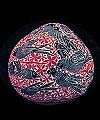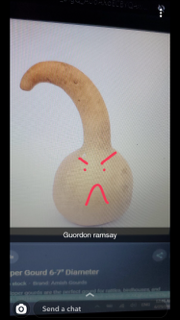Gourd art
Gourd art involves creating works of art using Lagenaria spp. hard-shell gourds as an art medium. Gourd surfaces may be carved, painted, sanded, burned, dyed, and polished. Typically, a harvested gourd is left to dry over a period of months before the woody surface is suitable for decorating.[1]
Gourd decoration, including pyrography, is an ancient tradition in Africa and Asia as well as among the indigenous peoples of the Americas,[2] notably the central highland people of Peru, the Navajo, Hopi and Pueblo nations of the American Southwest, and the Nuxálk and Haida nations of British Columbia. Gourd crafting and painting has evolved from early hand carvings to the modern day use, by some, of electric wood burners and high-speed pen-shaped rotary tools that can be used to inscribe almost any design.
A wide variety of gourd shapes and sizes yields an array of art pieces, including: ornaments, bowls, sculpture, vases, and wall art such as masks. Artistic styles can range from craft to fine art. Perhaps the most prolific and successful gourd artist in the United States is Robert Rivera of New Mexico.[3]
The American Gourd Society, headquartered in Kokomo, Indiana, was founded in 1937 and publishes its own magazine. The Canadian Gourd Society was formed in 1999 and is located in Kitchener, Ontario. Both are national nonprofit organizations dedicated to the education and instruction of those interested in gourd history, cultivation, painting, crafts, and participating in competitions. Gourd Art shows and festivals occur in many places throughout North America, the oldest running festival was founded in North Carolina in 1942. In recent years, Internet technology has considerably broadened exposure to the art form which in turn has helped generate a marked increase in the number of participants. In North America, gourd art has been the subject of specialty television programs such as The Carol Duvall Show on Home & Garden Television. No longer considered just a craft, gourd art is being elevated to the point where it has been featured in a number of galleries and magazines and exhibited at the United States Botanic Garden in Washington, D.C.
In 2003, gourd artists from the United States, Australia, and Canada got together to create the world's first Gourdpatch quilt.[4] Each artist brought their particular artistic style to a flat 4" × 4" gourd tile which was stitched together to create a quilt.
Worldwide examples
 Birds of Peru in a fruit tree, by Ivonne Alfaro-Nùñez and Cristian Alfaro-Nùñez of Cochas, Peru. This gourd is three inches tall.
Birds of Peru in a fruit tree, by Ivonne Alfaro-Nùñez and Cristian Alfaro-Nùñez of Cochas, Peru. This gourd is three inches tall. Gourd art by Nurettin Taskaya
Gourd art by Nurettin Taskaya- Gourd art by France Benoit
- Gourd art by France Benoit and Anne Simard
 CardinalAspens - Gourd Art by Bonnie Gibson of Arizona
CardinalAspens - Gourd Art by Bonnie Gibson of Arizona Selection of gourd art by Susan Davis from Sylva, North Carolina.
Selection of gourd art by Susan Davis from Sylva, North Carolina.

References
- Mohr, Angela (2007). Gourd Art Basics: The Complete Guide to Cleaning, Preparation and Repair (illustrated ed.). Schiffer Publishing. ISBN 978-0764328299. Retrieved 2020-01-20.
- Neimeyer, Karen. "Gourds In American History" (PDF). Retrieved 2020-01-20.
- "Gourd Art by Robert Rivera". Kachina House. Retrieved 2020-01-20.
- Macfarlane, David. Gourd Patch Quilt, Beyond the Basics Gourd Art. pp. 76–79.